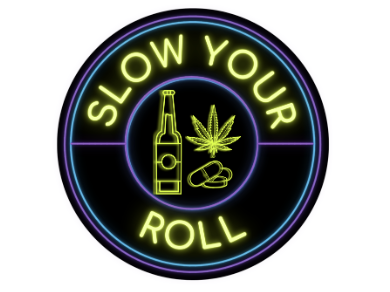
Slow Your Roll is an initiative to encourage students to moderate their substance use and other unhealthy behaviors by using harm reduction strategies. Moderating substance use is about controlling the frequency and amount of use to minimize potential negative impacts on health, relationships, and well-being. This approach involves setting personal boundaries and developing strategies to manage use in a balanced, mindful way. Moderation can help prevent dependency, improve mental clarity, and promote healthier relationships with substances.
Tips for Moderating Substance Use
- Set Clear Goals: Decide on specific, measurable limits (e.g., no more than 2 drinks in a sitting, 2 nights a week). Knowing your boundaries helps you track progress and stay accountable.
- Plan Ahead: If you're going to a social event where substance use is common, decide in advance how much you'll consume. This helps reduce impulse decisions.
- Pace Yourself: Slow down your consumption by taking breaks between drinks or doses. Hydrate with water or have non-alcoholic drinks in between to stay in control and reduce overall intake.
- Be Mindful: Reflect on why you want to use the substance. Avoid using it as a way to escape stress or emotions. If emotional triggers are a factor, consider other coping strategies like exercise, meditation, or talking to someone. Engaging with nature, art, or community can be better self-soothing strategies.
- Take Regular Breaks: Schedule days or weeks of abstinence to reset and reassess your relationship with the substance. This helps gauge whether moderation is working and builds confidence in your control over use. Join other folks who are participating in activities such as Dry January - community support can make taking breaks easier.
- Avoid High-Risk Situations: Certain places, people, or emotional states may encourage overuse. Recognize these triggers and limit your exposure, or have a support system ready if you anticipate these situations.
- Track Your Use: Keeping a journal or using an app can help you stay aware of patterns, making it easier to adjust as needed. Daily use of any substance that is not prescribed to you should be a red flag that you need to slow your roll.
- Seek Support: Talk to friends, family, or a therapist who can encourage you to meet your moderation goals. Having a support system can help with accountability.
- Know Your Limits: If moderation becomes difficult or leads to frequent overuse, it may be time to seek professional help or consider abstinence as a healthier option.
- Celebrate Progress: Recognize the milestones you achieve in moderating your use. Positive reinforcement helps reinforce control and commitment to moderation.
By practicing moderation mindfully, individuals can foster a healthier, more balanced relationship with substances, promoting a lifestyle that aligns with their goals and well-being.
What is Heavy Substance Use?
Heavy substance use refers to the frequent and/or excessive consumption of substances like alcohol, drugs, or medications, often beyond recommended or safe limits. This pattern of use can significantly impact mental and physical health, leading to increased risks of addiction, chronic health problems, and social and legal consequences.
Key Characteristics of Heavy Substance Use
- High Frequency or Quantity: Consuming substances in large amounts or frequently (e.g., daily or binge usage).
- Increased Tolerance: Needing more of the substance to achieve the desired effect, which can escalate usage over time. Switching to more potent versions of the substance is a sign of increased tolerance.
- Dependence: Experiencing physical or psychological reliance, with symptoms of withdrawal when not using.
- Impact on Daily Life: Heavy use can interfere with work, relationships, finances, and overall quality of life.
- Health Risks: Prolonged heavy use is linked to numerous health issues, including liver disease, cardiovascular problems, cognitive impairment, and mental health disorders.
- Difficulty Reducing Use: Despite a desire to cut back, many struggle to control or moderate their use, which may indicate the development of substance use disorder (SUD).
- Use as a Coping Mechanism: Heavy users often rely on substances to manage stress, trauma, or emotional pain, which can reinforce a cycle of dependency.
If you are having difficulty moderating your substance use, consider getting support from a healthcare professional.
Support
- Emerson Wellness Center: EWC is confidential resources accessible to all Emerson Students for support or referrals to other options for care. Students can call 617-824-8666 or emailing emersonwellnesscenter [at] emerson.edu (emersonwellnesscenter[at]emerson[dot]edu)
- Substance Abuse and Mental Health Services Administration Helpline
- CDC’s Check your Drinking Self-Assessment
- Partnership to End Addiction: Reducing the Risk of Marijuana Use
- Reframe App: Reframe is an evidence-based app to help people develop healthier drinking habits.
- Sunnyside App: An Evidence-based alcohol moderation platform to help you gain control of your drinking.